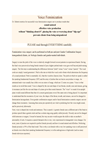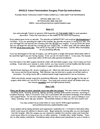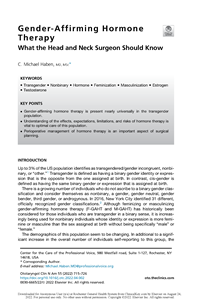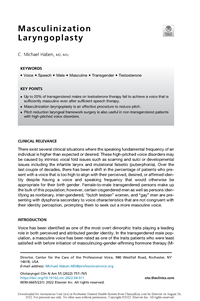
OFFICE HOURS |
OFFICE INFORMATION |
||
|
Monday - Friday |
8:30am - 4:30pm |
980 Westfall Road |
[Phone] 585.442.1110 |
 |
I Would Like To:
|
Voice Feminization
Dr. Haben's goals for voice feminization surgery are to produce results that:
sound natural
effortless voice production ...
without "thinking about it", placing the voice or worrying about "slip-ups"
prevents clients from being misgendered
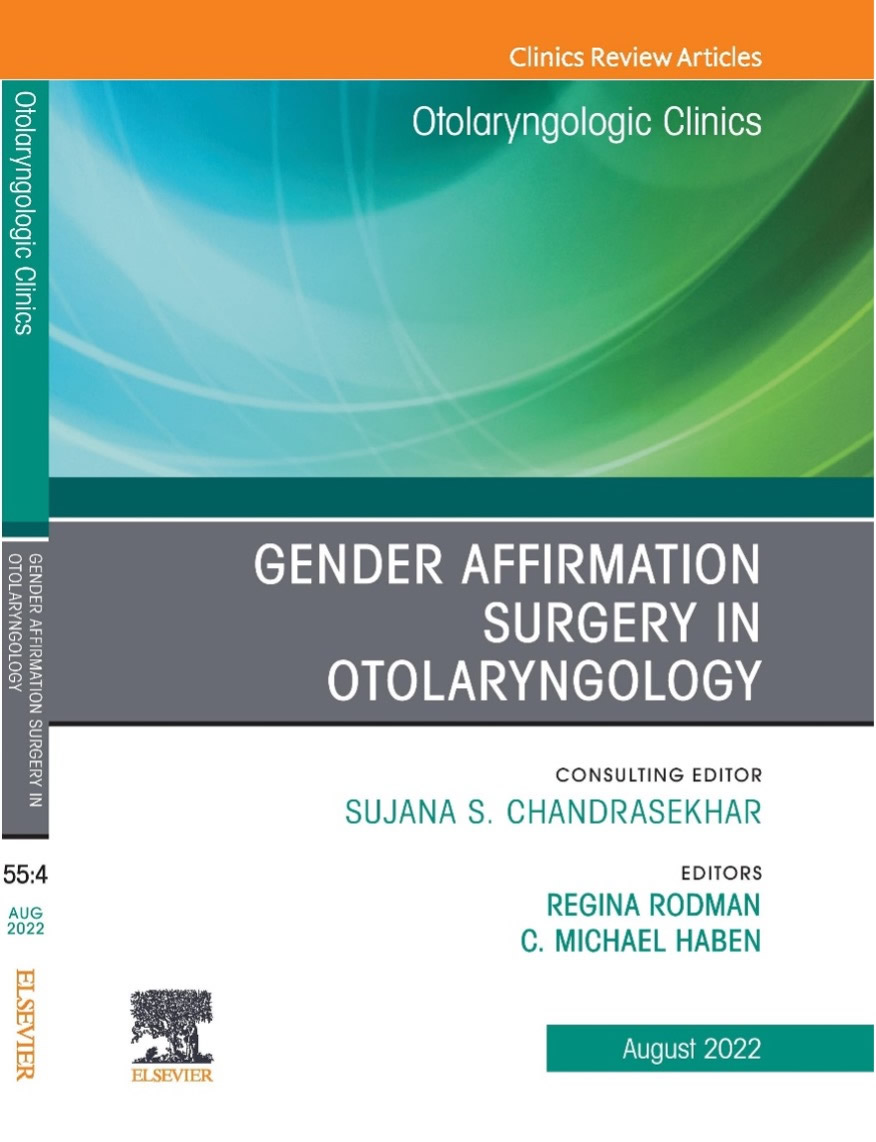
August 2022, Dr. Haben co-edited the definitive guide to Gender Affirmation Surgery of the voice, face and neck, in addition to authoring two of the chapters. The chapters are here available for download:
PLEASE read through EVERYTHING carefully.
Feminization voice surgery can be performed on both pre and post Gender Affirmation Surgery transgendered clients, cisgendered females, and gender-neutral individuals. Surgery to raise the pitch of the voice is relatively straightforward for most patients in experienced hands. The average cisgendered female speaking fundamental frequency is roughly 200 hertz with a range between 165 and 235 hertz. Women’s voices tend to be on the lower end of this range if they are older than 40, taller, heavier, or ever smoked. The average cisgendered male speaking fundamental frequency is roughly 120 hertz with an average between 85 and 155 hertz, or roughly 9 semitones (notes) lower on a piano than a cisgendered female.
Pitch elevation is finite. The degree of pitch elevation depends on many factors including one’s baseline unplaced pitch; lifetime smoking status; age; healing; laryngeal anatomy; break point to falsetto/ overall vocal range; body size; prior vocal fold surgery or history of vocal fold scarring/nodules/polyps and the presence of chronic medical conditions.
Pitch can typically be raised 2/3 of an octave or 8 notes (approximately 60-75 hertz ±25-40 hertz) on average and in many cases requiring one or more feminization techniques. Not all clients get meaningful pitch elevation while others can achieve a significantly greater degree. Please see below for more information on the metrics of success and guarantees. A thorough in-person, pre-operative evaluation will help predict the degree the pitch could be raised under ideal conditions.
If you look inside a real piano the higher notes have the shorter, tighter, and thinner strings. Human vocal cords vibrate in much the same way as piano strings. Dr. Haben has created and refined several surgical techniques, alone or in combination, with the purpose of achieving shorter, tighter, and thinner vocal cords. The goal is to produce a natural sounding, effortless speaking frequency as close to the cisgendered female range as possible given one’s anatomy and healing. These include techniques that are endoscopic ('through-the-mouth'), open ('with an incision') and a combination of both.
"Single" Feminization
"Minimally-Invasive" Feminization Laryngoplasty
Laser-Assisted Vocal Fold Webbing
Wendler Glottoplasty
These are different terms for shortening the vocal folds using an endoscopic, minimally-invasive, laser-assisted procedure which can be done as a stand-alone surgery or with a Crico-Thyroid Approximation ("CTA"), and/ or thyroid chondroplasty (tracheal shave) as described below. The terms are descriptive and essentially synonymous with the intent to shorten the functional length of the vocal folds thereby raising the pitch.
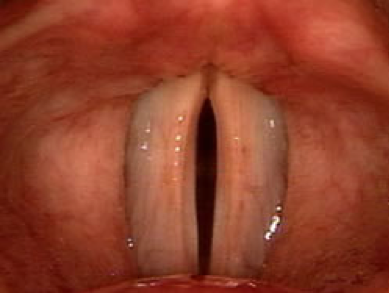
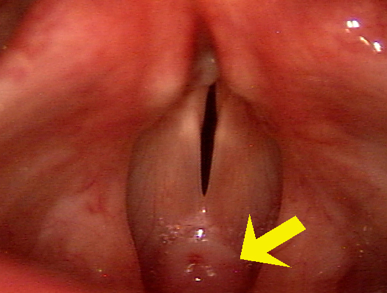
CLINIC images before and 6 months after the minimally-invasive feminization alone. Notice the controlled webbing where the yellow arrow is pointing, shortening the functional length of the vocal cords.
PROS of minimally-invasive endoscopic feminization voice surgery alone?
Best for those with a speaking fundamental frequency already in the upper cisgendered male or androgynous range
No incision in the neck, less invasive, quicker recovery
Pitch could be elevated by as much as 50 hertz on average and in many cases
Less time in the O.R., therefore less expensive
More dynamic range, important for those who sing
CONS of minimally-invasive endoscopic feminization voice surgery alone?
NOT recommended for clients 40 years or older without special permission (see FAQs below)
Not ideal for those with low or average cisgendered male baseline speaking fundamental frequency
Less pitch elevation compared to open and endoscopic technique combined
Procedure shortens vocal folds but can not stretch, tighten or thin them like a rubber band
More of the natural lower range is preserved, undesirable to some clients
Minimally-Invasive Feminization Examples
The following examples represent average results in typical healthy non-smoking clients having undergone the minimally-invasive endoscopic feminization voice surgery alone. These examples aim to provide potential clients with realistic, achievable, and reasonable expectations in good candidates. Although these examples are average and typical, not everyone achieves the same results and there are no guarantees as to the degree of pitch elevation.
![]() : The patient's speaking fundamental frequency is centered around 165 hertz which is in the androgynous range. Post-operatively the pitch is centered around 215 hertz, or middle cisgendered female range, representing a typical and average result of 50 hertz of pitch elevation and a soft natural sound.
: The patient's speaking fundamental frequency is centered around 165 hertz which is in the androgynous range. Post-operatively the pitch is centered around 215 hertz, or middle cisgendered female range, representing a typical and average result of 50 hertz of pitch elevation and a soft natural sound.
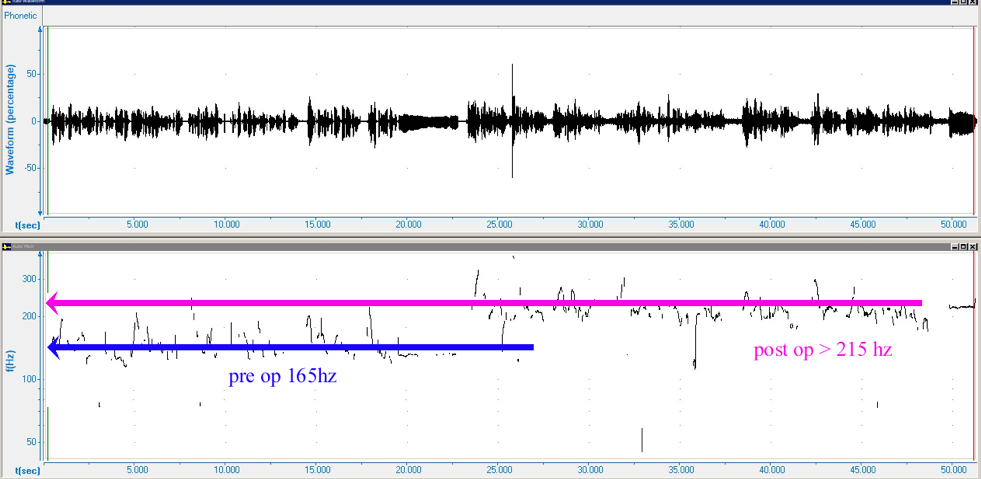
![]() :Pre-operatively, the speaking fundamental frequency is centered around 120 hertz, an average cisgendered male voice. 3 months after minimally-invasive endoscopic feminization voice surgery the pitch is centered around 195 hertz representing about 2/3 of an octave gained which is modestly greater than average pitch elevation.
:Pre-operatively, the speaking fundamental frequency is centered around 120 hertz, an average cisgendered male voice. 3 months after minimally-invasive endoscopic feminization voice surgery the pitch is centered around 195 hertz representing about 2/3 of an octave gained which is modestly greater than average pitch elevation.
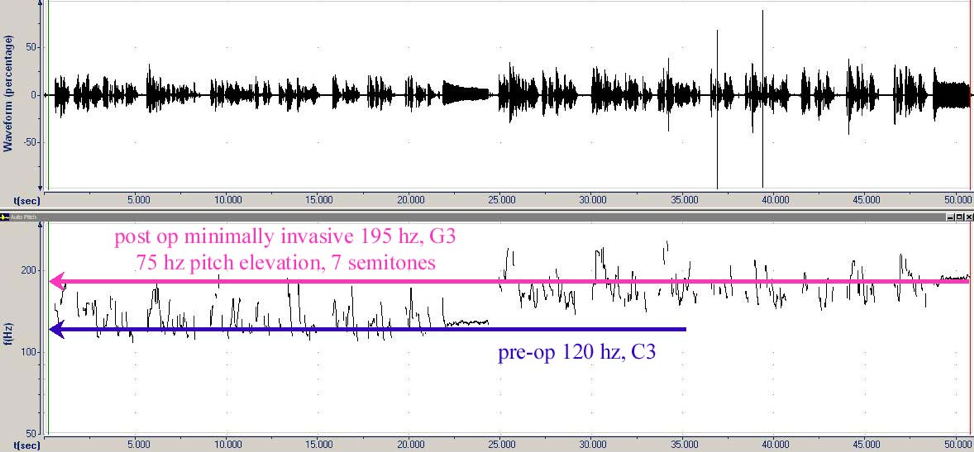
Additional Pre and Post "SINGLE" audio examples:
REVISION minimally invasive feminization
LASER-Assisted Voice Adjustment (LAVA)
On occasion, feminization procedures performed elsewhere, aka Wendler Glottoplasty, or Dr. Haben’s minimally invasive feminization procedure does not heal as expected and a revision procedure is recommended. Sometimes the endoscopic portion DID heal correctly but insufficient pitch elevation was gained. In these cases, revision surgery or a LAVA procedure may, in very select cases, provide additional pitch elevation. A revision procedure or LAVA is a decision made on a case-by-case basis and not all clients will be eligible. In general, for those who are deemed reasonable candidates for a revision procedure or LAVA, the addition of BoTox therapy is recommended. There is an additional charge for BoTox medication. Given the fluctuating cost of the medication, please contact the clinic for the most up-to-date information.
NOTE: as with procedures paid for by private or government insurance, revision surgery will incur a cost.
"Open" Feminization Laryngoplasty
Crico-Thyroid Approximation (CTA)
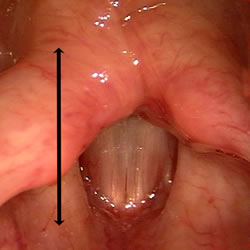
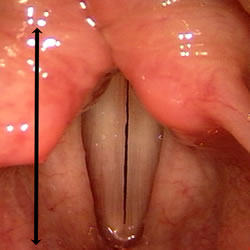
The vocal folds can be stretched and thinned by making a small incision in a skin crease in the neck and tightening the cartilages that now allow one to go from a regular to a falsetto voice. A "CTA" mimics contraction of the "singer's muscles", the cricothyroids. When contracted, the cricothyroids raise the pitch the way one could now when engaging the falsetto voice. Through the same incision the Adam's Apple can be shaved, a procedure termed thyroid chondroplasty (aka tracheal shave). I those having had prior facial feminization with a tracheal shave, the tracheal shave would need to be re-done (see FAQ) as part of the "triple." The neck incision is about 2-3 inches long and is hidden as best as possible in a skin crease.
PROS of the CTA added to the endoscopic glottoplasty?
Recommended in clients over 40 years, former smokers and those with low/ average cisgendered male voice Raises pitch more effectively and consistently higher than an endoscopic procedure alone Stretches and thins the vocal cords in addition to shortening their functional length Better eliminates the lower baritone range
CONS of the CTA added to the endoscopic glottoplasty?
Speech is somewhat more effortful for the first few months Incision takes 6-12 months to mature, overall longer recovery CTA stitches MAY loosen over time with MINOR pitch reduction, occasionally necessitating revision Takes longer in the O.R., therefore more expensive
Not recommended in those where the singing voice is very important as it diminishes the dynamic range
"Triple" Feminization Examples
The following examples represent average results in typical healthy non-smoking clients having undergone the open (with CTA) and endoscopic feminization with thyroid chondroplasty (aka “triple”). These examples aim to provide potential clients with realistic, achievable, and reasonable expectations in good candidates. Although these examples are average and typical, not everyone achieves the same results and there are no guarantees as to the degree of pitch elevation.
![]() :
:
Acoustic analysis in a patient with an average cisgendered male baseline speaking voice. Preoperatively, the speaking fundamental frequency is centered around 115 hertz. Postoperatively the pitch is now centered around 220 hertz representing nearly a full octave of pitch elevation and into the upper average cisgendered female range.
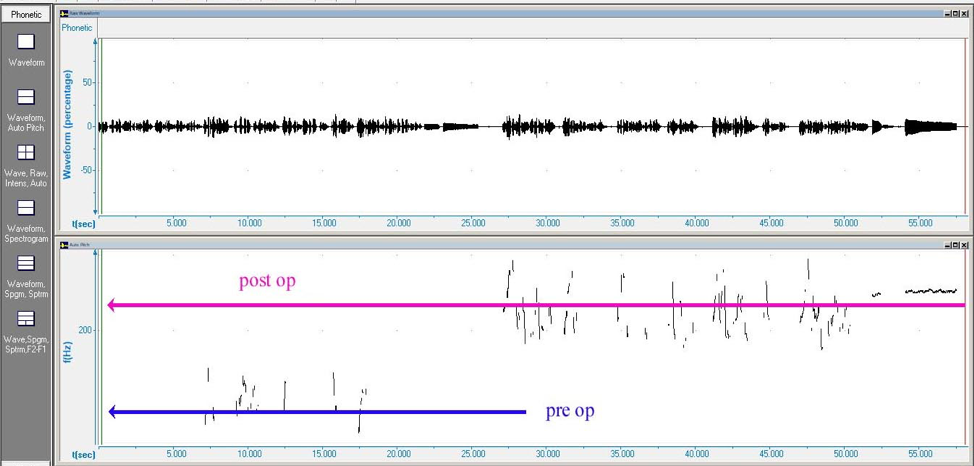
![]() :
:
Acoustic analysis in a client with a roughly average cisgendered male baseline speaking voice. Preoperatively the speaking fundamental frequency is centered around 135 hertz. Postoperatively the client achieved a modestly greater than average 100 hertz pitch elevation to 235 hertz.
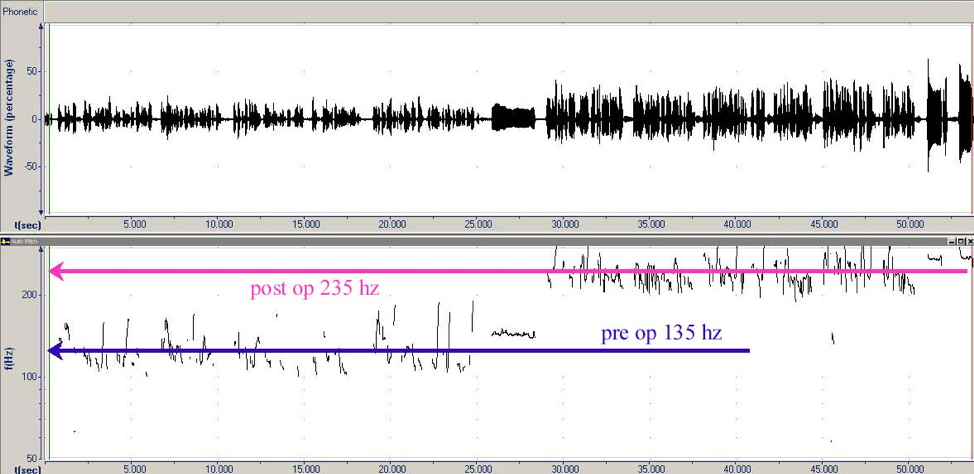
Additional Pre and Post "TRIPLE" audio examples:
Revision CTA
A CTA might loosen in time in a small percentage of individuals. IF this occurs, it usually happens between the first and second years and is almost always in younger clients with softer cartilages. The CTA is much LESS likely to loosen after a revision CTA because the scarring from the prior CTA provides some rigidity to the cartilages. As with revision endoscopic and LAVA procedures, not all clients will be candidates for revision CTA and decisions are made on a case-by-case basis.
NOTE: as with procedures paid for by private or government insurance, revision surgery will incur a cost.Thyroid Chondroplasty
aka Tracheal Shave
aka Adam’s Apple Shave
CAN you do a stand-alone tracheal shave without any voice feminization surgery?
Yes. The incision for the tracheal shave is hidden under the chin instead of being placed lower in the neck as is required for the CTA.
CAN you do the minimally-invasive feminization AND a tracheal shave withOUT a CTA?
Yes! It is considered a "DOUBLE.” The incision for the tracheal shave is hidden under the chin instead of being placed lower in the neck as is required for the CTA..
Thyroid Chondroplasty Examples
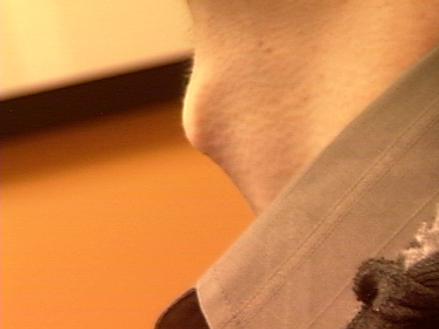
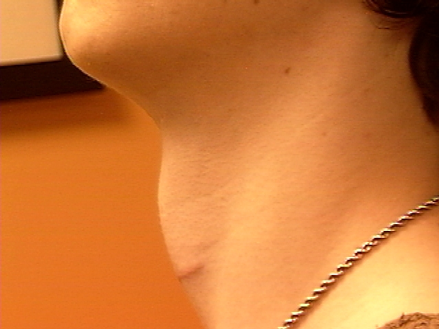
EXAMPLE above of a “tracheal shave” done as part of the triple feminization. With the triple the incision must be made in a skin crease lower in the neck. The above incision is only 3 months old and NOT mature.
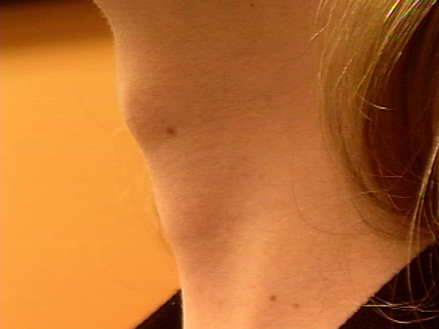
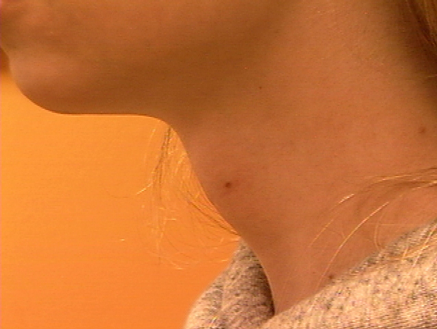
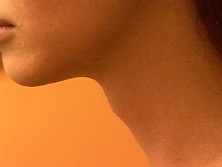
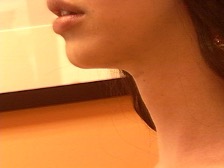
EXAMPLES above of a “tracheal shave” done as a stand-alone procedure or as part of a “double" feminization. The "Adam's Apple" does not need to be overly prominent preoperatively to benefit from the procedure. Note that the incision is hidden under the chin. The above incisions are mature at over 12 months old.
Cost:
PLEASE NOTE:
Costs are dictated by the hospital and anticipated to increase annually.
All feminization voice surgeries are considered elective cosmetic procedures, and, as such, are not covered by any private or government insurance, in whole or in part regardless of insurance policies or coverage elsewhere. Unfortunately, we do not participate in Care Credit or have payment plans available.
Each of the procedures come packaged to include the cost of the surgery; pre-operative consultations and all post-operative visits; ALL hospital charges for outpatient surgery including associated anesthesia and hospital/ facility fees. Postoperative medications are not included; however, private insurance frequently covers this modest expense. Travel, lodging, airport/ hospital/ clinic transfers; meals; entertainment; special testing, postoperative medications, and overnight in-patient hospital observation (if necessary) are not included in the package. Overnight hospital observation is mandatory for those traveling without a chaperone.
PLEASE read the sections on REFUNDS, GUARANTEES and REVISIONS carefully.
The package for the SINGLE minimally-invasive feminization voice surgery is approximately $7,900 (inclusive of the deposit). The hospital requires payment of a $2,500 credit card deposit to secure a confirmed surgery date. The surgery deposit is non-refundable.
NOTE: Additional cost for overnight hospital observation for clients without a chaperone is approximately +$1,190.
The package for the TRIPLE open and endoscopic feminization voice surgery with thyroid chondroplasty is approximately $9,800 (inclusive of the deposit). The hospital requires payment of a $3,500 credit card deposit to secure a confirmed surgery date. The surgery deposit is non-refundable.
NOTE: Additional cost for overnight hospital observation for clients without a chaperone is approximately +$1,190.
The package for the DOUBLE minimally-invasive feminization voice surgery with thyroid chondroplasty is approximately $8,880 (inclusive of the deposit). The hospital requires payment of a $3,000 credit card deposit to secure a confirmed surgery date. The surgery deposit is non-refundable.
NOTE: Additional cost for overnight hospital observation for clients without a chaperone is approximately +$1,190.
The package for stand-alone THYROID CHONDROPLASTY (tracheal shave) withOUT voice feminization surgery is approximately $6,950 (inclusive of the deposit). The hospital requires payment of a $1,500 credit card deposit to secure a confirmed surgery date. The surgery deposit is non-refundable.
NOTE: Additional cost for overnight hospital observation for clients without a chaperone is approximately +$1,190.
The package for a REVISION CTA, REVISION SINGLE or LAVA procedure is currently $5,980 (inclusive of the deposit). NOTE: This applies ONLY to procedures done initially by Dr. Haben and NOT to feminization surgery completed elsewhere. The hospital requires payment of a $500 credit card deposit to secure a confirmed surgery date. The surgery deposit is non-refundable.
NOTE: Additional cost for overnight hospital observation for clients without a chaperone is approximately +$1,190. Additional cost for BoTox therapy, if required, is available upon request.
Refunds:
What is the policy regarding refunds? Can surgery be rescheduled?
A: We understand emergencies occur. We are happy to reschedule your surgery at no additional cost, however, should you need to reschedule until a subsequent calendar year, you would be subject to any cost increase imposed by the hospital. If the rescheduled date falls within the same calendar year as the original surgery date, no cost increase will occur. Surgery deposits are NON-REFUNDABLE under all circumstances once made UNLESS at the time of the INITIAL consultation a client is not deemed a surgical candidate at the sole discretion of Dr. Haben. In the exceedingly rare circumstance when this occurs, clients are issued an immediate refund of the surgery deposit minus the consultation fee. Surgery deposits otherwise do not expire and can be applied at any point in the future towards a procedure. Prevailing costs at the time of rescheduling would apply.
What if my case is cancelled/postponed for a medical reason?
A: It is particularly important that you disclose any medical condition well before surgery. Should you develop a cough, cold, flu, illness (including COVID-19) or breathing problem the week or two before surgery you must call the office at once. Your surgery might need to be rescheduled at no additional cost if within the same pricing period. Rarely, clients are not cleared for surgery due to an undisclosed medical condition after they have travelled to New York and are awaiting their procedure. Your surgery will be postponed until the medical condition has been evaluated/ corrected and your procedure will be rescheduled for the first available date. There may be hospital costs if unexpected or additional testing is required. No reimbursement is possible for the transportation and lodging expenses incurred.
What if I miss my pre-operative consultation the day before surgery?
A: The pre-op consultation on the day or two before surgery is mandatory even if you have had a prior in-person consultation. If you miss this appointment your surgery will be rescheduled even if it was missed due to travel delays / bad weather or circumstances beyond your control. We recommend anyone traveling during the winter months, having a connecting flight, or coming internationally to arrive a day early.Guarantees:
Are my results or degree of pitch elevation guaranteed? Am I paying for surgery or a specific result?
A: You are paying for a surgical procedure which has inherent risks, including that of non-healing, surgical failure, and suboptimal results. The degree of pitch elevation is finite and largely determined by the size, shape, age, condition, and mass of your larynx. As such, there can be no outcome guarantees, implied or expressed. Dr. Haben will use decades of experience having performed hundreds of voice procedures to provide each client with the best possible opportunity for success.Revisions:
Can the surgery be revised if I wish for more pitch elevation? Is there a cost?
A: It is unusual for voice feminization procedures to require revision in our practice. When it does occur, it is generally related to suboptimal compliance with postoperative restrictions. Rarely, suboptimal results occur when only the minimally-invasive procedure is done and healed normally, or due to non-healing. Determining the best path forward requires an in-personal evaluation and discussion, which is included as part of the previous package’s post-operative care. The revision surgery itself is NOT included.
NOTE: As with procedures paid for by private or government insurance, revision surgery will incur charges dictated by the hospital.FAQ:
What if I would like to come in just for a consultation?
A: Consultations are for one hour and include voice analysis, physical examination, a scope of the larynx and a lengthy discussion regarding expectations. The $500 consultation fee will be applied towards the surgery deposit.
Can I just send you a voice recording?
A: Voice analysis is only a small part of determining whether a client is a suitable candidate for voice surgery and cannot replace an in-person consultation which includes a scope of the larynx.
Where is the incision?
A: The incision for the “double” or stand-alone thyroid chondroplasty is hidden under the chin. The incision for the “triple” is made in a skin crease in the middle of the neck. All incisions are closed using plastic surgery technique.
Can I get a letter of support for name/gender change legal petitions?
A: Absolutely, once the procedure has been completed.General:
How many surgeries does the Center perform? Is the surgeon Board Certified? Fellowship trained?
A: The Center is dedicated to laryngeal surgery. Dr. Haben has performed hundreds of pitch alteration surgeries and thousands of voice surgeries. The different techniques involved in feminization voice surgery have been developed by Dr. Haben and continue to be perfected at the practice over the last 20+ years. Dr. Haben is Board Certified in Otolaryngology and Fellowship trained in laryngology and voice surgery, as well as earning a Master's Degree for his research in voice and laryngology. Dr. Haben routinely lectures and publishes on voice surgery and related topics. Recently, he authored and edited a special edition of Clinics of Otolaryngology on gender affirmation surgery for ears, nose and throat physicians and lectures at the American Academy as an expert on feminization voice surgery. A copy of his publication on the topic may be found above.
Why is a chaperone needed after the surgery? What if I do not have one?
A: All feminization procedures are performed under general anesthesia. It is mandatory hospital, State and Federal guidelines that any patient undergoing general anesthesia MUST have a responsible adult with them for 24 hours after surgery. An acceptable chaperone must be 18 years or older and known to the client for at least one year. It is UNACCEPTABLE to "meet" a chaperone while in Rochester, "bunk" with another client having surgery the same day, or "hire" someone to stay with you. If you are not accompanied by an acceptable chaperone, you will be required to spend the night in the hospital at additional cost.
Do you accept Care Credit? How much is required to confirm a surgery date? What payments are accepted?
What happens if I need to change the surgery date at the last minute? How far in advance do you book?
A: The practice does not accept Care Credit. Credit cards are the preferred method of payment. Surgery may only be booked and confirmed once the deposit is made. Changes are permitted without penalty, as long as the policy is not repetitively abused, and the new surgery date falls within the same calendar year. Rescheduled surgery dates to a subsequent calendar year may be subject to hospital imposed annual price increases. Most non-peak surgery dates book 2-3 months in advance.
Do you accept Medicare or private insurance for feminization? Do I get any forms that can be submitted to my insurance? Or to my accountant for taxes? Is there a procedure (CPT) code for the surgery?
A: Feminization voice surgery is an elective cosmetic procedure. We neither accept Government nor private insurance for the procedure. We are not permitted to submit any forms to government or private insurance. An itemized receipt for the surgical deposit is provided. Itemized receipt for hospital charges can only be obtained by the patient directly from the hospital. We are not responsible for insurance reimbursement, tax rebates or credits. Receipts can NOT be altered, modified or amended under any circumstance to meet any requested criteria. The procedure (CPT) code used for feminization laryngoplasty is 31599.
All your surgery dates are on Wednesdays. Do you operate any other day?
A: No. All surgeries occur on a Wednesday, and the practice cannot accommodate special requests.
How will we communicate?
A: It is vitally important that we have an accurate e-mail, telephone number and current mailing address. ALL confirmations and instructions occur via e-mail, and it will be your responsibility to check your e-mail often as your surgery date approaches.
Travel:
Can I book my travel first and then call for a surgery date?
A: No. The hospital does not allow confirmation of a surgery date until the deposit is paid. We cannot "hold" a date without payment and strongly advise against booking travel until you receive confirmation of your surgery date by e-mail.
Any advice for foreign travelers?
A: We recommend informing your credit card company of your travels and having a back-up just in case.
Medical Questions:
Is there pre-operative testing required? I have heard that some surgeons require a CT scan before to prevent damage to the vocal cords.
A: In general no, unless you have a chronic medical condition, such as diabetes, or a history of heart problems, etcetera. Sometimes medical clearance from your Primary Care Physician is required. If you have a question or concern, please contact our office before you make any arrangements. The hospital will make a pre-operative telephone call to you the week or so before the surgery and make any necessary testing or clearance recommendations. You MUST arrange to be available for the preoperative call or your surgery could be POSTPONED. A CT scan is not required.
Should I see my primary care physician first? What if I have a chronic medical condition?
A: In most cases it is not necessary, however, if you have a chronic medical condition such as asthma or heart problems; have not seen a doctor in many years; are concerned about your ability to undergo general anesthesia or are over age 60 a visit to your PCP is advised.
Do you perform the surgery on someone under 18? Older than 60?
A: Clients under 18 must have parental permission, be accompanied by a parent or legal guardian and have a letter of support from a qualified psychologist or psychiatrist. There is no "maximum age" however, the expectation for achieving a truly feminine sounding voice diminish with age due to reduced plasticity, hardening of the cartilages, stiffening of the vocal cords, and less optimal healing compared to younger individuals. Results, and corresponding expectations, should be more modest in older individuals. This does not mean that very good results cannot be achieved, just that they are harder to accomplish due to factors that are out of our control. Reasonable expectations will vary from client to client and can only be determined at the time of consultation and examination with voice analysis.
I am/was a smoker. Does this matter? What about vaping?
A: Dr. Haben will not perform surgery in active or very recent smokers / vapers due to the exceedingly high surgical failure rate. Overall, former smokers heal worse than nonsmokers. Current or recent smokers fare much worse than former smokers. Smokers and/or vapers should completely quit a minimum of 3 months preoperatively, and 12 months postoperatively (ideally, permanently!). Of course, the amount and duration of smoking or vaping matters a lot. We do not test for recent or current smoking or vaping, relying on patients to tell the truth. Failure to disclose prior/ recent/ current smoking or vaping status inevitably results in suboptimal outcomes, frustration, and disappointment. Current and/ or postoperative smoking or vaping (or extensive second-hand smoke exposure) will have a significantly negative impact on success. Former smoking or vaping does not automatically prevent successful surgery. Candidacy would be determined at the time of consultation\
What is the rule regarding marijuana?
A: We understand many women use marijuana to treat stress and anxiety. Edibles and/or oils are permitted. Smoked, vaped, pipes/bongs or chewed marijuana are NOT permitted and should be stopped a minimum of 3 months preoperatively and 12 months postoperatively.
Do I need to stop my hormones?
A: No, except after the midnight before your procedure. You may restart hormones the day after surgery.Operation and Technique:
Which / whose technique does Dr. Haben use?
A: Dr. Haben has developed his own technique, having performed hundreds of successful pitch alteration surgeries over the last two decades. Dr. Haben is not able to comment on how his technique differs from that of other surgeons or clinics.
I have heard of BoTox being used to keep the vocal cords “still” after surgery. Can this be done?
A: It is generally NOT necessary to use BoTox except in revision cases, however, it can be considered in unique circumstances. There is an additional charge to cover the cost of the BoTox that is not included in the package.
Can you re-use a prior scar? Do you use a "plastic surgery" type closure?
A: In general, a prior incision cannot be re-used. Incisions are as small as possible without compromising the surgery; hidden to the greatest extent possible in a skin crease; and closed using plastic surgery technique.
I am a singer. How does this impact things?
A: Pitch-elevating feminization voice surgery does not give anyone a singing voice that did not exist before. Nor does it give additional soprano or falsetto range. The surgery is intended to raise the pitch of the speaking voice and not positively impact singing range or capabilities.
I hear there is a risk for a chipped or broken tooth or teeth?
A: The endoscopic portion of the procedure is "trans-oral" (through-the-mouth). Every precaution is taken with the teeth, however clients with smaller mouths, larger tongues, sleep apnea, limited neck extension, baseline poor dentition or extensive dental work are at an increased risk. Overall, there is a 5% risk for intra-operative dental trauma. If you have had extensive dental work, have bad dentition or are concerned about the risk of dental trauma you may contact your local dentist to create a SOFT, UPPER custom tooth guard. In ALL patients, a standard toothguard is provided and used during surgery.
How long is the surgery? How long am I in the hospital?
A: 2 hours in the operating room for double and triple feminization procedure; 1 hour for single feminizations and stand-alone thyroid chondroplasty. Clients arrive 1-1.5 hours before the surgery and leave 2-3 hours afterwards. Plan on 6 hours start to finish.
Do you need to place a urinary catheter during surgery?
A: No.
I have changed my mind and want my old voice back, can the procedure be reversed?
A: No. Just so that Dr. Haben is clear: no.
Post-operative:
Once I come off voice rest, what will my voice sound like? Will it be feminine?
A; Once you come off post operative voice rest your voice will sound much, MUCH worse before it gets better. Expect it to be quite hoarse and rough sounding. This is due to 'surgical laryngitis' from the procedure and can last from a few weeks to months depending on how you heal. Do not worry, this is normal and expected. The surgical laryngitis is usually resolved by 12 weeks however the final result could take 6-12 months when all healing has finished.
Do some clients get longer voice rest? Is there a benefit for longer voice rest? I use my voice a lot for my work. When can I resume my normal voice usage without harming my voice?
A: All clients are placed on strict, non-negotiable, absolute, and mandatory voice rest for 30 days. Additional voice rest is not required in most cases. Once you complete the voice rest you may use your voice to an average, reasonable amount. Do not yell for 6 months. Do not whisper for 6 months. Speak normally but expect a raspy hoarse voice for up to 6 months.
For how long can the voice improve, and the pitch elevate? Why?
A: The voice just begins to heal by 3 months. Pitch and quality continue to improve up to 12 months due to the almost 100% formation of scar tissue over the vocal cord stitches. These typically go away on their own by 12 months. This is the reason that the final voice result does not occur for a year.
Is there much post-operative pain?
A: No. Most people state that the pain is tolerable and controlled well-enough with near constant icing of the incision for the first week (for the double and triple procedures) with use of ibuprofen + Tylenol at the same time. Having a little more or a little less pain is not a sign of "something wrong" unless the pain increases day after day which could indicate an infection. All patients with an incision are placed on post operative antibiotics and steroids.
Can I use anti-scar cream or patches? What about the stitch removal?
A: The neck incision is as small as possible, hidden in a skin crease and closed with plastic surgery technique. All but one suture is absorbable. The one (blue) stitch on the outside is removed on the seventh post-operative day either by Dr. Haben (whenever possible) or by a medical person in your community. If your local medical professional has any questions regarding removal of the stitch they are encouraged to call the office. Clients may not remove their own suture. Once the suture is removed you may start to shower. Pat, do not rub, the incision dry after showering for the first month. If going outdoors, use a >30 SPF sunscreen, or cover the incision with a scarf. Anti-scar creams/ patches, Vitamin E oils, etcetera, may be used after the suture is removed. Scars typically take 12 months to mature and heal. 12 months. Be patient.
Any other advice for the incision/scar?
A: Yes! Keep an ice pack over the incision for at least 20 minutes at a time, at minimum 4-5 times per day for the first seven days. After the suture is removed, take a towel and wet it with water as hot as you can comfortably stand (hot compress) and hold it over the incision for 20 minutes, 4-5 times a day until day 30. This helps it heal.
It is somewhat effortful to produce voice for the first few months even though it sounds great. Why?
A: Your larynx, your “instrument" has been tuned to a much higher frequency. As such, you will now have to learn to "play" a violin when you were used to playing a cello. The effortful feeling goes away after 12 months.
How many times am I seen post-operatively? Can I get voice analysis of the final product?
A: All clients are seen the day after surgery and cleared for travel. All clients are recommended to return at 3 months for an examination and voice analysis. All post-operative care is included in the package, even if you have questions or concerns YEARS down the road. For those who cannot make it back at 3 months, Dr. Haben recommends recording the first half of the "Rainbow Passage" (found on the internet) on a smartphone and e-mailing it for analysis. You will receive a reply comparing pre- and post-operative vocal parameters, a copy of both pre and post recordings as well as the voice analysis in 4-6 weeks.
When can I have other elective surgery without harming my throat? When are things permanent?
A: >6 months. 3 months is minimum however you would need to be seen and examined in person before clearance could be granted. In cases where it has not healed and clearance is not granted you should be prepared to delay the elective surgery. In cases of emergency surgery, you will proceed with the unplanned emergency procedure and you and Dr. Haben will deal with whatever happens afterwards if necessary. Always tell your anesthesiologist that you have had voice feminization surgery and that they should use a "smaller" breathing tube and give steroids. If they have questions, the anesthesiologist is encouraged to call the office to speak with Dr. Haben for specific recommendations.
I am concerned about the sutures in my vocal cords. Can they break? What about coughing?
A: In general, patients should ONLY be concerned with factors that they have direct control over such as compliance with the post-operative instructions and taking their medications. DO NOT WORRY about factors which one has no control, such as talking in your sleep, slip-ups, single coughs or emergency surgery. The only way to know if a suture in the vocal cord has broken is with a scope. NOTE: the sutures are only necessary for the first month and are expected to break eventually.
I misplaced the post-operative instructions, where can I get a copy?
A: At the top of this webpage.

